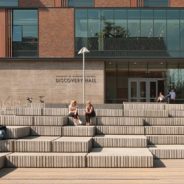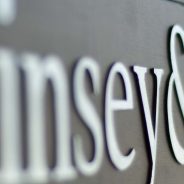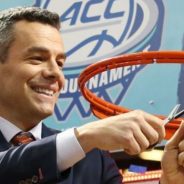Search results for Where Should I Work:
What are the Fastest MBA Programs in Boston?
Some students want to complete their MBA coursework as quickly and efficiently as possible—time is money after all! Continue reading…
Inside the MBA World Summit with Two Berkeley Haas MBA Students
Every year, one hundred of the top MBA students worldwide are selected to attend the MBA World Summit out of an applicant pool of 3,000. This once in a lifetime opportunity brings together driven individuals from across the globe to expand their networks and debate some of the most pressing issues of the time. From March 14 – 17, 2018, it was a three-day immersive experience in Cape Town, South Africa that focused on social impact. Continue reading…
Your Essential Guide to Pre-MBA Diversity Conferences, Boot Camps, and Forums
Several organizations are focused on helping increase the pipeline of underrepresented demographics—such as women, LGBTQ students, and those from diverse cultural and ethnic backgrounds—to business school and the larger business world. As part of these efforts, many host MBA diversity conferences, boot camps, and forums providing recruiting and networking opportunities to admitted students headed off to business school in the fall. For eligible participants, these opportunities, designed to provide a head start for students in the MBA recruiting process before they even arrive on campus, are well worth pursuing.
Forté MBA Women’s Leadership Conference
 The Forté Foundation, a non-profit consortium of leading companies and top business schools, works specifically to expand opportunities for women in business through a range of financial and educational opportunities. A centerpiece of these efforts is the annual Forté MBA Women’s Leadership Conference, which will take place this year in Atlanta on June 15 and 16. Registration is now open for both current business school students and those slated to start their MBA programs next fall.
The Forté Foundation, a non-profit consortium of leading companies and top business schools, works specifically to expand opportunities for women in business through a range of financial and educational opportunities. A centerpiece of these efforts is the annual Forté MBA Women’s Leadership Conference, which will take place this year in Atlanta on June 15 and 16. Registration is now open for both current business school students and those slated to start their MBA programs next fall.
The two-day conference provides an opportunity for women pursuing their MBA to connect with hundreds of other like-minded students. Billed as a chance to “learn from highly successful business leaders how to develop stand-out skills and project an authentic leadership style,” it also presents valuable networking opportunities. Highlights of this year’s conference include a meet and greet with Fortune 100 recruiters, more than 150 speakers and presentations from a variety of industries and career paths, and a keynote lecture by USA Today Editor-In-Chief Joanne Lipman. Conference attendees can also take part in the Forté Power Pitch Competition, pitching their ventures to a panel of judges for a chance at cash prizes.
Reaching Out MBA Conference
 LGBTQ+ students and their allies should familiarize themselves, if they are not already, with Reaching Out MBA (ROMBA). This organization focuses on educating current and prospective MBA students on LGBTQ-specific issues and connecting current LGBTQ students with each other and with alumni communities.
LGBTQ+ students and their allies should familiarize themselves, if they are not already, with Reaching Out MBA (ROMBA). This organization focuses on educating current and prospective MBA students on LGBTQ-specific issues and connecting current LGBTQ students with each other and with alumni communities.
“The conference connects more than 1,600 members of the LGBTQ MBA student and alumni community with more than 90 companies looking specifically or LGBTQ talent,” ROMBA Executive Director Matt Kidd explains. Registration is now open for this year’s conference, which will take place in Minneapolis on October 4th through 6th.
ROMBA also helps prepare students in advance of the conference. “We want to ensure they are well positioned for their conversations with our corporate partners at the conference and beyond,” Kidd adds. ROMBA also offers pre-admission mentoring, a summer consulting project, and webinars designed to help students gain a full understanding of the industries represented at the conference.
MBA JumpStart
 Unlike Forté and ROMBA, which focus on specific student demographic groups, other organizations offer pre-MBA opportunities for students from a range of diverse backgrounds. One such organization, JumpStart Advisory Group (JSAG), provides an array of resources and tools through its ongoing Diversity Forums.
Unlike Forté and ROMBA, which focus on specific student demographic groups, other organizations offer pre-MBA opportunities for students from a range of diverse backgrounds. One such organization, JumpStart Advisory Group (JSAG), provides an array of resources and tools through its ongoing Diversity Forums.
JumpStart will host its Brand Management and Marketing Diversity Forum in Philadelphia on May 20th and 21st and its Financial Services and Consulting Diversity Forum in Chicago from July 10th through 13th. In Chicago, finance will be the focus on Tuesday and Wednesday and consulting on Thursday and Friday, although enrolled students interested in learning about both industries can choose to attend the entire event.
“Selected students from top-tier MBA programs attend industry-specific workshops, are introduced to case studies, and are provided with endless opportunities for networking with corporate partner representatives and other incoming MBA students prior to matriculation,” according to the JumpStart website. Students interested in attending should apply here by May 13.
“Diversity for MBA JumpStart is defined as individuals that are under-represented in business including women, Black, African-American, or of African descent, Hispanic, Latin-American, or of Latin descent, Native American or American Indian, Asian and Pacific Islander,” the website notes.
School-Year Fellowship Opportunities
In addition to pre-MBA conferences and workshops, students from diverse backgrounds can also apply for a range of fellowship opportunities once they have been admitted to a leading MBA program.
The Toigo Foundation, which is focused on the finance industry, aims to prepare under-represented MBA students for leadership roles and help foster environments where diverse students can thrive during and after their MBA. Recipients of the Toigo Fellowship participate in two weekends of intense training during each year of their MBA program. These training sessions include leadership development and mentoring, networking opportunities, and the chance to make lasting connections across a range of financial industries. Applications are due by April 30, and financial awards vary depending on achievement and financial need. “The selection of each year’s class of Toigo Fellows is a fluid process and not limited to a specific number,” notes the Tioga website. “Recently, we have selected as many as 80 students (from our applicant pool of nearly 400) to become Toigo Fellows.”
In addition to the nonprofit organizations listed above, many well-known corporations also offer fellowship programs of their own that include financial assistance, conferences, and bootcamp-style experiences for students of color, LGBTQ students, and students with disabilities.
For example, Bank of America Merrill Lynch offers a $40,000 fellowship toward first-year tuition as well as a paid summer internship and opportunities for additional funding in the second year of business school. Goldman Sachs features a similar MBA fellowship program that provides funding to cover first-year tuition, a guaranteed summer associate salary, and a signing bonus that carries an additional $40,000 award upon acceptance of a post-MBA full-time offer. To learn about even more corporate MBA fellowship opportunities, click here.
Now, we understand completely that the thought of another application process on the heels of applying to business school may seem groan-worthy to many. But for students from diverse backgrounds, exploring the opportunities presented as part of these pre-MBA diversity conferences, boot camps, forums, and fellowship programs can certainly make the additional effort pay off.
This article has been edited and republished with permissions from our sister site, Clear Admit.
In Search of the Best Chicago Internships for MBAs
Chicago is an ideal place to earn an MBA. In addition to having some of the strongest business schools in the country, the Chicago area is home to nearly 40 of the Fortune 500 companies. The bustling metro is also the financial and cultural hub of the Midwest, making it an ideal place for major corporations to set up large outposts. This means a wealth of internship program opportunities for MBAs at the start of their careers. So, for those with the gusto to live in the gustiest metro, the rewards can be huge. Below, we’ve laid out at which companies Chicago MBAs most often seek internships with.

Given Amazon’s involvement in nearly every industry, it is no surprise that the company is on the hunt for innovative MBAs to help maintain its dominance and status as the world’s greatest internet retailer. The mammoth corporation assigns interns a project for which they will partner with clients to glean true insight into the inner-workings of the company.
According to the Wall Street Journal, “Amazon took in more interns from the University of Chicago’s Booth School of Business than either Bain & Co. or McKinsey & Co., which were until recently the school’s top hirers of interns …” Amazon also offers many interns the opportunity to come back to work at the company full-time.
Just last year, Amazon was a major player in hiring Chicago Booth School of Business MBA graduates and interns. Twenty-six graduates managed to earn a full-time job with the company, while an impressive 33 interns joined its ranks, which was the single highest total among all companies that employed Booth interns.
The companyalso brought in students from nearby Indiana. Several Class of 2018 MBA students from the Notre Dame University Mendoza College of Business earned vital internship program experience at Amazon, which often leads to direct hiring.

Many of the companies hiring MBA interns offer exposure to retail, tech, and financial services, or consulting. But Abbott Laboratories, headquartered in Lake Bluff, Illinois, is a popular internship destination for MBAs interested in pursuing a career in pharmaceuticals. The Commercial MBA Internship allows interns to get their foot in the door of this massive and growing industry.
Several MBAs at the Kellogg School of Management at Northwestern University joined Abbot Laboratories, according to the school’s most recent employment report, joined the company’s summer internship program.

Deloitte, which has a Chicago office located right near the iconic Willis Tower, employs 40,000 people in the U.S. The company’s Client Service Internship can take place throughout the course of a semester or over two months during the summer. Consulting tends to be a popular area of focus for MBA grads, but Deloitte also offers a plethora of opportunities for advanced degree students interested in financial sectors such as auditing and tax. Depending on their interests and professional backgrounds, interns can join a client service team in Deloitte & Touch LLP, Deloitte Tax LLP, Deloitte Risk and Financial Advisory, or Deloitte Consulting LLP. According to The Balance, summer interns at Deloitte can make anywhere from $3,850-$12,000 per month. Deloitte also made Fortune’s list of “25 Top MBA Employers.”
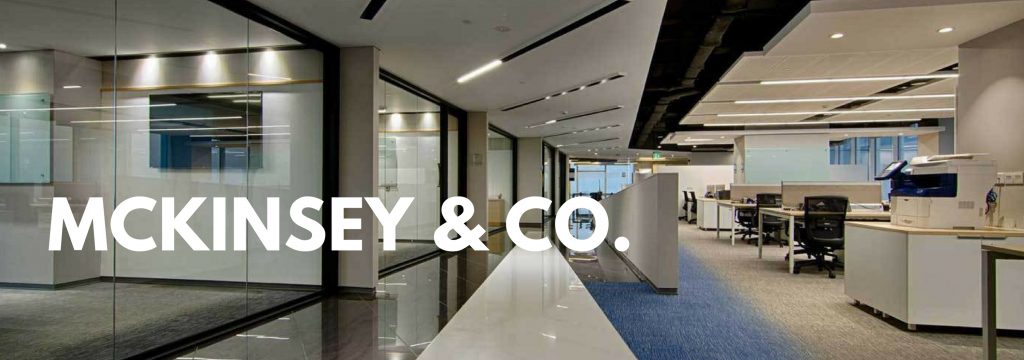
Around 50 percent of McKinsey & Company’s incoming hires have MBA degrees, so business school recruiting is a high priority for the mega firm. The consulting giant—which now has over 120 offices worldwide—was actually founded in Chicago in the 1920s, so it makes sense that the company is one of Chicago metro’s most active MBA recruiters. Though gaining entry to the elite consulting firm is extremely competitive, both University of Chicago’s Booth School of Business and Northwestern University’s Kellogg School of Business have been able to claim the company as one of the top places their MBA students land for internships and full-time employment after graduation.
In fact, no company hired more Booth grads than McKinsey and Co. The company managed to snag a staggering 48 employees from the business school last year, which accounted for nearly 10 percent of the entire Booth MBA Class of 2017. Not so surprisingly, McKinsey also brought in 26 Booth interns within the same year—the second most among any employers in that time frame.
So, what should an MBA at in the McKinsey internship program expect? According to the firm’s website, MBA interns “… join us as associates, working either as generalists or practice consultants if they have and area they’d like to focus on.”
MBA Battle: BU Questrom v. BC Carroll
Boston College and Boston University are two of the metro’s most popular and recognizable schools. But for two schools with a lot in common, BU and BC don’t seem to like each other much. Continue reading…
Where Toys R Us Went Wrong, Sawyer International Business Etiquette, and More – Boston News
Let’s explore some of the most interesting stories that have emerged from Boston business schools this week.
Here’s What Sunk Toys R Us – MIT Sloan Newsroom
Experts from MIT Sloan offered a few choice insights into what Toys “R” Us, whose future currently remains in flux, could learn from the hiccups along its 70 year-long history.
Senior lecturer in work and organization studies Peter Kurzina writes that Toys “R” Us “ignored Amazon eating their lunch, thus failed to prepare and meet the challenge of competition.”
Associate professor of finance Andrey Malenko, a fellow MIT Sloan colleague, also critiqued the toy giant’s enormous debt burden. “If you’re running a business that might be sensitive to e-commerce, to the recession, then loading up on debt as much as [Toys “R” Us] did, it’s very risky and you probably shouldn’t do it.”

In March 2018, Toys “R” Us announced it would be closing all US and UK locations.
Read more of the duo’s analysis here.
International Business Basics – Sawyer Business Blog
The act of doing business across cultures often entails unexpected byproducts that Sawyer addressed in its recent “Business Protocol Across the Globe” forum, organized by Colombian native Laura Reales, BSBA ‘18.
“What if I wanted to move to another part of the world, like Saudi Arabia or France or China? How could I make connections with people so that I don’t look ignorant of their culture? So I decided to create a space where it was ok to talk about those differences.”
Read here to learn the answers to questions like, “What’s the proper way to present a business card in China?” and “What’s a good way to begin a negotiation in Turkey?”
Alumnus’ Company serves the Housing Needs of a Vulnerable Community – D’Amore-McKim Blog
The Northeastern University D’Amore-McKim School of Business profiled alum Andy Rosenthal, a 2007 alum who abandoned a lucrative career in hedge fund software to co-found the Terenbinth Group, which has become the “largest, family-owned provider of housing to people with intellectual and developmental disabilities.” Rosenthal explains his company’s model.
“We’re a real estate company focused on providing quality, safe, affordable housing to a vulnerable community,” Rosethal said in the interview. “In short, we find homes, fix them up, customize them to suit the tenants—think wheelchair accessibility, replacing door knobs with door levers, waterproof flooring, installing roll-in showers, etc.—and then rent them directly to the individuals.”
The company’s 68 homes currently accommodate more than 225 people across the state of Indiana and it’s looking to expand. You can learn more about the Terebinth Group’s plans here.
What are the Best Real Estate MBAs in Boston? – MetroMBA
Earlier this week we highlighted the three strongest Boston metro schools that can help you earn your way into the real estate industry: Harvard Business School, MIT Sloan, and the Babson College F.W. Olin Graduate School of Business.
Regarding Babson, writer Jillan Markowitz writes:
“At Babson College’s F.W. Olin Graduate School of Business, MBA students can pursue the finance concentration, which offers several courses in real estate. Students can rake courses like Real Estate Financial Modeling, Real Estate Fundamentals, or Real Estate Development. According to recent Olin graduate employment statistics, 10 percent of the 2017 MBA class landed jobs in real estate. This number may not seem overwhelming, but it dwarfs the percentage seen in many MBA programs (usually about two to three percent).”
Learn more about the best real estate programs in Boston here.
Georgetown Launches New MBA Certificate in Consumer Analytics and Insights
In response to overwhelming demand by students and recruiters, Georgetown University’s McDonough School of Business launched a new MBA Certificate in Consumer Analytics and Insights. The certificate delves deep into marketing data and analytics to provide MBA students with the necessary skills needed to drill down into consumer behavior and marketing practice through data. Continue reading…
Unfair Prestige, DePaul’s Master of Science in Taxation is Honored, and More – Chicago News
Let’s explore some of the most interesting stories that have emerged from Chicago business schools this week.
Juries Treat Prestigious Companies Differently in Employment Discrimination Suits – Kellogg Insight
New research from Northwestern University Kellogg School of Management professor of management and organizations Brayden King finds that organizations are often treated very differently when it comes to certain lawsuits, often depending upon the prestige of the company
“Prestige is harmful to organizations in that it draws attention to their potential hypocrisy. These companies are supposed to be standout examples of virtue in their industries or examples of how companies should behave. It makes them high-profile targets,” King writes. However, there are plenty of benefits to the prestigious title, much of which may be considered unfair.
When it comes to business, wrongfulness isn’t often attributed to the same company, even in the case of repeat offenses. Working with Mary-Hunter McDonnell, Kellogg Ph.D. graduate, the research found that “juries don’t make the same character attributions to chronically deviant organizations. They think about organizations differently.”
You can read more about the research here.
Employers Rank DePaul MS in Taxation Highly – Kellstadt News and Events
For the second consecutive year, TaxTalent has ranked DePaul’s Master of Science in Taxation degree third overall as part of its 2018 Top in Tax Educational Survey. MST assistant director Diane Kuhlmann believes that what sets DePaul’s degree apart from the pack is its combination of theoretical and practical pedagogy. Alumnus Ben Ulman ’17 raved about his experiences as part the MST program:
“The program has given me a pretty wide tax skillset. Tax is ever-changing and the program taught me what is current with laws and regulations. The best part of the program for me was the professors’ knowledge of taxation and the network you build from class.”
Learn more about DePaul’s MST degree here.
Making Financial Decisions: The Endowment Effect – MD Mag
Famed Chicago Booth professor Richard Thaler, the winner of the 2017 Nobel Memorial Prize in Economic Sciences for his esteemed work in behavioral economics, explained in his 1991 research “The Endowment Effect, Loss Aversion, and Status Quo Bias” (alongside Daniel Kahneman and Jack L. Knetsch) about the particular habits consumers have when valuing their own items. Simply put, if you own something, you tend to put a higher value on in than if you don’t.
This internal methodology often finds itself in daily financial situations, such as buying or selling a house, according to Shirley M. Mueller, MD.
“Although economists originally hypothesized that the endowment effect occurred because humans are loss-averse, new evidence suggests there is an additional reason under specific circumstances. We identify with something that is ours.”
Read more about the endowment effort phenomena and a unique student experiment here.
Online MBA
Online MBA Program Structure
Delivered online by American University’s Kogod School of Business, MBA@American takes a collaborative approach to preparing tomorrow’s business leaders. Through a blend of live online classes, in-person learning experiences and engaging assignments, students develop the critical skills to solve complex business. Students must earn 48 credits to complete the course, which typically takes 15 months. Students can enroll in one of four different start dates during the year.
American University’s Kogod School of Business is accredited by The Association to Advance Collegiate Schools of Business (AACSB International). AACSB accreditation represents the highest standard of achievement for business schools worldwide.
MBA@American uses innovative technology to create a highly customizable learning experience. Students in the program:
- participate in live, seminar-style classes of approximately 15 students
- discover the intersection between business and politics at American University campus in Washington, D.C.
- gain access to WeWork locations in cities worldwide collaborate, study, and network
Curriculum
Courses and coursework are authored by the same renowned Kogod faculty who teach on campus, and students are held to the same admissions and academic standards as their on-campus counterparts.
Program Requirements
- 48 credits to complete
- 13 core courses
- 2 elective courses
- 2 in-person immersions
Core Courses
- Business Fundamentals
- Business Law, Ethics, and Governance
- Financial Accounting
- Managerial Economics
- Financial Management
- Managerial Accounting and Operations Management
- Management of Organization and Human Capital
- Manager in the International Economy
- Managerial Statistics
- Management Information Systems
- Strategic Thinking for Decisions
- Marketing Management
- Strategic Decision Making
In addition to online courses and assignments, MBA@American students attend in-person immersion experiences known as Business in the Capital. These outings see students come together with classmates and faculty for hands-on learning both on campus at American University and in major business centers around the world.
Concentrations Available:
- Business Analytics
- Consulting
- Marketing
- Finance
- Cybersecurity
- Legal Studies
Students in the MBA@American also have the option to pursue an Analytics Certificate in addition to your MBA degree for no additional cost or time to complete. The certificate is designed to prepare you to predict behaviors and make sound business decisions using data analysis. In addition to your 12 core MBA courses and two immersions, you will complete three analytics electives:
- Business Insights through Analytics
- Predictive Analytics
- Business Intelligence or Database and Big Data
Class Profile
The vast majority of students in the Kogod Online MBA program (98 percent) had some amount of previous professional work experience, averaging around 65 months (5.4 years).
Students in the program are, on average, 31-years old. The class is made up of roughly 52% male students and 48% female students. In addition, 48% of students are minority students and 7% are military members.
Tuition, Scholarships, and Financial Aid
Business@American students are charged tuition on a per-credit-hour basis and the current rate of tuition for the October 2020 through July 2021 classes is $1,812 per credit hour. The total cost of tuition for the MBA@American is roughly $86,976, which is the same for both in-state and out-of-state students. Students must also participate in two different immersion programs in order to complete the program in which fees will vary. Extemporaneous non-tuition fees, such as books, room, board and loan fees may also vary.
Admissions
No standardized test scores or minimum professional work experience is required to apply to the program. However, applicants to the MBA@American program must have an accredited Bachelor’s degree and submit a résumé, two letters of recommendation, an application with a fee of $100 and two essays.
The first essay serves as your personal statement. It should highlight your strengths, how your background has prepared you to succeed in a graduate program, and reasons for pursuing your degree at Kogod. The second essay addresses how your prior experience, academic and/or professional, signals your readiness for graduate business study.
Admissions for International Students
The MBA@American allows students from around the world to study the same curriculum as those who attend on-campus, and learn from the same American University faculty.
Coursework for the online business programs can be completed 24/7 from any Internet-enabled device, and students will have the option to select from a range of course times to help best fit our renowned degree programs into their lives.
English Language Proficiency Assessments
| Exam | Kogod Code | Minimum Score |
|---|---|---|
| TOEFL | B113 | 100 IBT |
| IELTS | N/A | 7.0 |
| PTE | X1QSK50 | 68 |
English Language Proficiency Waiver
Waiver of the English Language Proficiency requirement is possible in the following scenarios:
- Applicants who have completed an undergraduate or graduate degree in a country in which the native language is English (includes USA, UK, Canada, Australia, New Zealand, and Ireland only).
- Applicants who have studied abroad or completed dual or joint degree programs permitted the duration of study in the English speaking country is a minimum of 3 or more years.
Application Deadlines
The MBA@America has four start dates throughout the year. Kogod accepts applications on a rolling basis. The application deadlines for the MBA@American are:
| Program Start Date | Priority Application Deadline | Final Application Deadline |
|---|---|---|
| October 2020 | July 20, 2020 | August 17, 2020 |
| January 2021 | November 2, 2020 | November 30, 2020 |
The Pacific Northwest MBA Conference Arrives April 21, 2018
On Saturday, April 21, 2018, the annual Pacific Northwest MBA Conference will be held at the T-Mobile HQ in Factoria, Bellevue, hosting an array of talented, experienced MBA professionals, recruiters, and executives together in a one-of-a-kind networking opportunity.
Top MBA Recruiters: IBM
Finding a job after graduating with your MBA isn’t typically the issue. There are hundreds of industries and companies that would be happy to hire a freshly minted MBA graduate. The trouble is choosing the right company and job for you. If IBM hasn’t been on your list of top tech companies, maybe it should be.
About IBM
Headquartered in Armonk, New York—north of NYC and bordering Connecticut—IBM (International Business Machines Corporation) is a multinational technology company that operates in over 170 countries worldwide. It got its start in 1911, and since that time has manufactured leading-edge computer hardware, middleware, and software. The company also provides hosting and consulting services across the technology industry on topics ranging from mainframe computers to nanotechnology.
IBM is dedicated to a constant state of innovation, which is evidenced by its performance. In 2017, the company earned $79.1 billion in revenue and demonstrated that it’s still a cutting-edge technology company by expanding on many of its services including the IBM Cloud—who’s revenue accounted for 21 percent of total revenue. Other top products from the company include:
- z14: The world’s most powerful transaction system that encrypts data at scale, all the time.
- POWER9: POWER9 systems and software cut training times by 4x and boost AI accuracy.
- IBM Q Experience: The world’s first (and only) prototype 50-qubit system, which leads in quantum computing.
And IBM is always looking for new ways to be competitive. Last year, the company spent $5.6 billion on research and development. And in 2016, IBM filed 8,000 patents (the most of any company). It’s a company that is moving forward quickly, which can make it an exciting prospect for many MBA students. So, why should you work for IBM?
Why IBM?
Nicknamed Big Blue, the appeal of working for a company like IBM is fairly obvious. It’s one of the world’s largest employers with over 380,000 employees as of 2016, and those employees are top notch. Throughout the company’s history, employees have been awarded:
- Five Nobel Prizes
- Six Turing Awards
- Ten National Medals of Technology
- Five National Medals of Science
And some former IBM employees include Apple CEO Tim Cook, Microsoft Chairman John W. Thompson, SAP Co-Founder Hasso Plattner, and former Lenovo CEO Steve Ward.
In addition, if you choose to work for IBM, you have the opportunity to work almost anywhere in the world. The company has several main campuses across the globe including:
- Austin, Texas
- Raleigh-Durham, North Carolina
- Rochester, Minnesota
- New York City, New York
- Silicon Valley, California
- Rome, Italy
- Winchester, UK
- Johannesburg, South Africa
- Tokyo, Japan
And that’s just to name a few of IBM’s premier locations. And no matter where you land a job, you’ll be called an “IBMer” and receive a myriad of benefits including group life insurance, survivor benefits, paid vacation, and more.
In 2017, IBM was also recognized by Mogul as one of the Top 100 Innovators in Diversity & Inclusion as well as one of the Top 100 Companies for Millennial Women. And in 2015, IBM was named to Working Mother’s 100 Best Companies list for the 30th consecutive year.
Landing a Job at IBM
So, how do you land a job at IBM as a new MBA graduate? There are a few options. The first is the IBM General Management Leadership Development Program (GMLDP), which is the premier leadership development program for top MBA graduates. If you’re accepted, you’re hired into IBM on an accelerated path to leadership with opportunities across many of IBM’s areas including cloud, Watson, digital, offering management, and consulting.
And speaking of consulting, MBA graduates also have the opportunity to work as consultants in IBM Global Business Services. Within this area, MBA consultants are given a chance to combine sophisticated analytics with market-leading global solutions to provide deep industry insight and expertise alongside an actionable plan.
At any given time, there are over 5,000 job openings available in every industry and area from project management to marketing. Some available jobs for MBA graduates include:
- Strategy Consultant
- Projects Manager
- Account Executive
- Offering Manager
- Associate Partner for Tech/Data Strategy
- Digital Business Consultant
- Business Analyst
Meet an Employee
According to Nish Parekh, who leads IBM’s client and partner programming teaching businesses how to use IBM’s Watson technology, she’s living her dream. With Watson, she gets to work on the leading edge of AI technology and touch a variety of industries, which is exciting in and of itself.
“They bring in a lot of people from different parts of IBM, as well as some folks from outside IBM. Seeing the mix and all these people work together is fun. I get to learn from them,” Parekh told Fast Company. “Also, one of the greatest things about my job is the ability to stay on top of the latest and greatest technology. AI is up and coming; it’s exciting to be a part of that moment.”
Zicklin MBA Ranking Jumps in US News, and More – New York City News
Let’s explore some of the most interesting stories that have emerged from New York City business schools this week.
U.S. News & World Report Names Baruch College Among Nation’s 2019 Best Graduate Schools – Zicklin News
The Baruch College Zicklin School of Business knocked it out of the park in the recently revealed U.S. News & World Report “2019 Best Graduate Schools” list. The full-time MBA ranked 55th nationwide (moving up two spots from the previous year), 29th nationwide among public institutions, first among public institutions in both NYC and New York state, 3rd in NYC overall, and 5th in New York State overall.
The business school’s part-time MBA also ranked 56th nationwide (a 22-spot jump from last year’s list), 34th nationwide among public institutions, first among public institutions in both NYC and New York state, 3rd in NYC overall, and 3rd in New York state overall. Willem Kooyker, Dean of the Zicklin School of Business Dr. H. Fenwick Huss, Ph.D., said in a release:
“Graduates of the Zicklin School of Business lead major businesses around the globe. Our student success is based on an ever-evolving curriculum that today includes data science and analytics, machine learning and cybersecurity along with experiential learning opportunities for real-world problem solving and strategic planning.”
Read more about Zicklin’s showing in the US News & World Report rankings here.
Living Abroad Leads to a Clearer Sense of Self – Columbia Business School Blog
Social scientists from Columbia Business School, Rice, and UNC universities have recently published new research in the journal Organizational Behavior and Human Decision Processes that finds how “living abroad increases “self-concept clarity.”
The findings came after the group surveyed roughly 2,000 “participants from online panels and United States and international MBA programs” that had, at one point, studied abroad.
Entitled “The Shortest Path to Oneself Leads Around the World: Living Abroad Increases Self-Concept Clarity,” the study reveals that “living abroad triggers self-discerning reflections in which people grapple with the different cultural values and norms of their home and host cultures. These reflections are helpful in discovering which values and norms define who people are and which simply reflect their cultural upbringing.”
You can check out the rest of the study here.
Goldman Sachs Executive Recounts Journey to Success in Finance – Gabelli Connect
Goldman Sachs President and Co-Chief Operating Officer Harvey M. Schwartz used his recent Fordham Wall Street Council talk as an opportunity to discuss his unlikely journey from a post-high school gym employee to Wall Street innovator as he stands on the precipice of retirement.
“Innovation is present in financial services. I think that if you have an interest in solving complex problems for clients or specific areas of markets, there is a unique way to participate. The takeaway should be that if you work hard, people will invest in you.”
Glean more wisdom from Schwartz’s talk here.
The MBA Real Estate Boom: Inside The Schulich Real Estate Program
Real estate is booming. In fact, according to the Financial Times, commercial property asset values and investment yields have surpassed levels prior to the Great Recession, and there is continued strong demand for offices, urban apartments, and more. It’s all thanks to continued low interest rates and tight supply.
What has this real estate boom meant for business schools? It’s meant a decrease in interest in banking and an increase in interest for real estate study, particularly among MBA students who understand the cycle and want to get involved while they can. The reality is that there are many jobs in real estate, and that’s what MBA students want.
According to Sherena Hussain, an assistant professor in Infrastructure at the York University Schulich School of Business, “The real estate and infrastructure sectors account for a large proportion of a nation’s GDP.” So, it shouldn’t be surprising that many top MBA programs are prioritizing real estate curriculum, specializations, and clubs for their students.
Real Estate and Infrastructure at the Schulich School
Real estate and infrastructure have an indispensable role at the Schulich School. Not only does the school offer a Master of Real Estate and Infrastructure (REI), but MBA students can also specialize their curriculum with a focus on REI. The MBA specialization focuses on “creating and maintaining places for living, working, shopping, learning, recreation and culture, and the critical accompanying support systems ranging from mobility and logistical networks, to utilities and energy supply,” according to the school website.
One of the reasons behind the MBA REI specialization at Schulich is Toronto itself.
“Many of the leading global Real Estate and Infrastructure firms are located in Toronto,” explains Hussain. “If you are interested in a career in real estate and infrastructure, Schulich’s MBA specialization is a rare opportunity to develop your understanding, skills, and network in a way that leverages the specialization’s top-tier reputation and committed faculty and alumni base.”
As part of the REI specialization, students must complete 12 credits focused on real estate including two required courses: Real Estate Finance & Investment and Development Prototypes. Other potential courses include:
- Partnership Models for Infrastructure Delivery
- Structuring Real Estate Transactions
- Commercial Real Estate Asset Management
“The idea behind the REI MBA specialization is to bring students to industry and industry into the classroom,” Hussain outlined in an email exchange with MetroMBA.
“Our faculty and sessional instructors have real-world experience and bring this perspective into the classroom by leveraging experiential learning at its finest. Examples include flying in senior policy officials to judge a capstone assignment about international infrastructure, bringing leading CEOs into the classroom as guest speakers in REI investment classes, or partnering with a leading national-law firm to have our students learn how to negotiate joint venture agreements. This is a small sample of how the REI MBA specialization approaches holistic learning.”
But holistic learning isn’t just regulated to the MBA program and inside classrooms. It can be found throughout the school, including within Schulich’s Real Estate and Infrastructure Club (SREIC).
Schulich Real Estate and Infrastructure Club
SREIC is open to all Schulich business students interested in learning more about pursuing a career in real estate and infrastructure. The club acts as a liaison between students, the industry, and professionals.
“SREIC offers MBA students an opportunity to supplement their learning with real-world, co-curricular programming and unique networking opportunities,” says Hussain. “It’s a student-run group that has the full backing of Schulich’s Real Estate and Infrastructure program faculty, and it is one of the most active student groups at the business school.”
Programming offered by the club includes:
- Value-Oriented Programming: site visits, breakfast seminars, conference engagements, project panels, case competitions, etc.
- Deep Industry and Alumni Relations: on a one-on-one and broad basis through speed mentoring, recruitment breakfasts, and keynote events.
- Leadership Development Opportunities: including the semi-annual resume book circulated to recruiters and senior leaders.
There are also several keynote events that take place each year including Schulich’s Developers’ Den international case competition, ARGUS training, and Schulich’s annual Perspectives Lecture. And one event that just took place in February was the annual New York City real estate study tour.
The study tour is part of a partnership with Columbia University’s real estate program, beginning several years ago. It’s a three-day intensive and transformative real estate experience that takes students to site visits and tours of leading real estate and infrastructure firms all over NYC. Some of those firms include Blackstone, Related Companies, Oxford, Vornado Realty, WSP, Brookfield, and Silverstein Properties. The goal is to give students a glimpse into the future of real estate
“Schulich students benefit from learning more about a new market, as well as having a basis for global comparative learning,” Hussain explains. “The partnership [with Columbia] offers an opportunity to develop a network of peers engaged in commercial real estate development in New York City and across the U.S. Each year, the club visits a development class held at Columbia University to learn more about their approaches to learning about real estate. In return, the Schulich School hosts an annual friendship dinner in Manhattan to offer more opportunities for students, alumni, and friends of industry from Canada and the U.S. to forge relationships.”
The trek is a unique event that gives Schulich students a chance to explore real estate and infrastructure in a whole new way.
“The 2018 SREIC New York trip was an excellent and well-balanced learning experience for students who are truly passionate about real estate and infrastructure,” says James Chang, an MBA student working to his REI specialization. “A prime example of ‘outside the classroom’ learning with the perfect balance between education, relationship building, and fun. I would highly recommend it to students in the MREI or MBA program to take advantage of this opportunity next year!”
To learn more about real estate and infrastructure at the Schulich School of Business, visit the school’s website.
MIT Sloan Student Travel Goes Carbon Conscious with Jetset Offset Program
Over spring break, 100 MIT Sloan students will travel the world to study while immersing themselves in different cultures. It’s a wonderful opportunity with one problem. There’s a pretty significant carbon impact—300 metric tons of carbon dioxide to be exact. But now, a new Jetset Offset pilot program could help lessen that negative impact.
When we fly, we can’t choose the energy efficiency of our plane, but that doesn’t mean we shouldn’t travel. Instead, it means we should try to lessen our impact on the environment by purchasing carbon offsets, and that’s exactly what the Jetset Offset program does.
In its first year, the pilot program will purchase carbon offsets for four study tours over spring break 2018—three MBA groups and one Master of Finance group. The carbon offsets will take the form of projects that help with carbon emissions. Such projects include reforestation or building renewable energy sources.
According to Yakov Berenshteyn, a ‘19 Leaders for Global Operations Fellow and the creator of the Jetset Offset program, while the impact might not be immediate, it’s a step in the right direction. “This is raising awareness of, and starting to account for, our environmental impacts from student travel,” he said.
The idea for Jetset Offset came about after Berenshteyn realized how many air miles students and staff were logging. In January, for the two-week Leaders for Global Operations Domestic Plant Trek, MIT logged more than 400,000 miles. Berenshteyn couldn’t help but think that there needed to be a counterbalance to all the burned jet fuel. After talking to MIT Sloan Professor John Sterman, he realized that applying carbon offsets and carbon-neutral practices was the best way to make a difference. Duke University had already implemented such a program.
So, for the January trip, the Leaders for Global Operations program purchased 67 metric tons of offsets through Gold Standard, which will go toward reforestation efforts in Panama. For future MIT Sloan trips, the MIT Sloan Student Life Office will pick up the tab.
“Yakov’s idea is exactly the kind of student initiative we love to support,” MIT Sloan associate director of student life Katie Ferrari said. “He is practicing principled, innovative leadership with an eye toward improving the world.”
To read the full news release, visit the MIT Sloan Newsroom.
This article has been edited and republished with permissions from our sister site, Clear Admit.
The Best Business Schools for Landing Top Consulting Jobs
Clear Admit recently explored which business schools help prepare MBAs the most for a career in consulting, which you can read below.
With starting salaries in the $140,000 to $150,000 range and a customary $25,000 signing bonus on top of that, it’s no wonder so many business school students target the prestige consulting firms known as the “MBB”—McKinsey & Company, Boston Consulting Group (BCG), and Bain & Company—as their post-MBA landing pads. That $170,000+ annual compensation package can quickly cut any MBA loan debt you may have taken on down to size.
Indeed, management consulting has been one of the most coveted career paths for fresh MBA grads for ages. And though the technology industry has in recent years been stealing some grads from the consulting industry’s traditional slice of the pie, the most recent MBA employment reports reveal that consulting is already making a comeback against tech at certain schools.
The opportunity to work with a range of clients comprised of many of the world’s most celebrated businesses across industries—tech included—is part of the appeal of consulting. In many ways, a top consulting gig allows MBA grads to continue their management education while getting paid for it—and further honing their skills and expertise by helping solve a wide variety of business challenges. And, not for nothing, breaking into the MBB is a highly competitive pursuit—one that almost assures that your colleagues will be smart, driven people you’ll get a lot out of working with.
Finally, where the top consulting firms are choosing to find their talent reflects on the quality of the education those schools’ students are getting. In many ways, the hiring practices of the MBB can serve as a gold star standard of sorts for MBA programs.
Elite Firms Hire Grads from Elite Business Schools
The crème de la crème of leading business school talent has headed toward the top consulting firms for decades—and performed well there—creating a virtuous circle of sorts in which the firms’ appetite for such talent only grows. And while this piece focuses on MBB, we should note that a host of other consulting firms—Deloitte, A.T. Kearney, Accenture, Strategy&, and Oliver Wyman among others—are also highly prized post-MBA destinations.
If you are looking to see which business schools send the greatest percentage of their graduates into consulting overall, don’t miss our September 2017 analysis of leading consulting industry feeder schools. Which schools top the list? And what stands out about how these schools successfully train students for careers in consulting?
Looking at Class of 2016 graduates, the University of Virginia’s Darden School led the pack, with 38 percent of its graduates heading into consulting. Columbia Business School was next, sending 35 percent, followed closely by Northwestern University’s Kellogg School of Management, which sent 33 percent.
The 2017 employment reports, which have been released since our analysis last fall, show some shifts year over year. Darden tied with Emory’s Goizueta School of Business in terms of the percentage of Class of 2017 grads who headed into consulting, with each school sending 34 percent. Close on their heels were Columbia, Duke’s Fuqua School of Business, Northwestern’s Kellogg School of Management, and Dartmouth’s Tuck School. All four sent 33 percent of their most recent graduating class off to consulting firms.
2 Non-U.S. Schools Lead All Others in Consulting-Bound ’17 MBA Grads
But year after year, one thing remains the same. INSEAD, with campuses in France, Singapore, and Abu Dhabi, beats all leading U.S. business schools when it comes to consulting. INSEAD’s 2016 MBA employment report, detailing employment outcomes for December 2015 and July 2016 INSEAD grads, shows that 46 percent went into consulting. And the most recent figures reveal that almost a full half—49 percent—of the 1,029 students who completed the INSEAD MBA program in December 2016 and July 2017 chose to either enter or return to the consulting field.

We should note here that INSEAD is distinct from many other schools in that it includes sponsored students who are returning to their pre-MBA employers among its hiring stats. This is in contrast to many U.S. schools, where the reported number and percentage of students hired by sector and employer corresponds to those students actively seeking employment, excluding sponsored students. Of the 49 percent of INSEAD 2017 grads headed into consulting, 33 percent were new hires and the remaining 16 percent were returnees.
London Business School (LBS) was the runner-up for the Class of 2017, sending 41 percent of grads into consulting. This was a 6 percentage-point gain over the school’s previous class of MBA graduates. Like INSEAD, LBS’s reported sector designation and top employer information includes sponsored students, only its employment report does not disclose what percentage of the class those returning students represent.
March Madness Begins: Consortium MBA Draft Takes Place Today
Clear Admit recently highlighted this year’s Consortium for Graduate Study in Management MBA Draft, which is offering huge scholarship payouts for a lucky few. Check it out below.
No, it has nothing to do with basketball. A draft of another sort will take place today, but for some MBA applicants it could be as big as getting by the Golden State Warriors. We’re talking about the annual draft for the Consortium for Graduate Study in Management. Each year, the group’s member business schools offer tens of millions of dollars in fellowships to hundreds of MBA applicants, most under-represented minorities.
Held annually in mid-March, the draft is a complex matching up of leading business schools and applicants based on the order of preference expressed by each. Consortium member schools include the University of Michigan’s Ross School, UVA’s Darden School, UC Berkeley’s Haas School, Dartmouth’s Tuck School, and NYU Stern, to name just a few. When applicants apply as part of the Consortium Fellowship process, they benefit from being able to apply to six of the 19 members schools using a single application (with volume discounts for multiple schools). But then comes the tough—and critical—part.
The Importance of Ranking Your Consortium Schools Carefully
You have to rank your selected schools in order of your desire to attend, which will determine the order in which you’ll be considered for the Consortium Fellowship, a merit-based, full-tuition award. (There is the pesky little detail about needing to gain admission to a school or schools on your list.) Provided you are admitted to some or all of the schools on your list, your ranking then comes into play. If your first-ranked school declines to award you funding through the Consortium, the opportunity will be passed on to the next school on your list, and so on. According to a Consortium employee, the order in which applicants have ranked their choices is not revealed explicitly to the schools. Instead, each school is just not given an opportunity to offer you the fellowship until theirs is the top remaining school on your list.
Of course, another important part of the Consortium application is demonstrating a proven commitment to increasing the ranks of African Americans, Hispanic Americans, and Native Americans in business education and corporate leadership. The Consortium was founded in 1966 by Washington University professor Sterling Schoen around the mission of equipping more African American men with the requisite business skills to succeed in corporate America. Three schools and 21 men took part in the first year. Additional schools began to join as members, and in 1970 applicant membership was widened to women, Hispanic Americans, and Native Americans. In 2004, in compliance with a Supreme Court ruling a year earlier, membership was opened to all U.S. citizens and permanent residents who demonstrate a track record of supporting the Consortium vision.
Today’s Consortium MBA Draft Day
Fast forward to today, draft day. Representatives from the member schools are gathering with Consortium staff to begin the complicated matchmaking process, which at least in recent years has taken place in a St. Louis hotel room near the Consortium’s Chesterfield, MO, headquarters. Unless things have changed dramatically with recent additions to the number of member schools—the group has grown from 17 in 2011 to 19 this past July—the process includes six rounds and takes about four hours to complete.
Schools come in with their draft picks in hand, and the school designated as first choice by the most applicants gets to choose as many of those students as it wants to offer the fellowship. And so it continues, passing on to each successive school to select from its first-round applicants. If a school passes on an applicant at any time in the process, another school can then select that applicant in a later round.
From the applicant’s point of view, here’s what it looks like: Let’s say that Yale SOM is your first-ranked school and you are admitted into its MBA program. In today’s draft, Yale SOM will have first dibs on offering you the Consortium Fellowship. If Yale SOM does offer you the fellowship, everyone’s happy and you can choose to attend with the benefit of the fellowship. You may still be admitted to other programs on your list, but these programs cannot offer you the Consortium Fellowship.
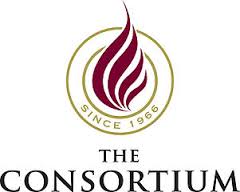
But say you were admitted to Yale SOM but it doesn’t offer you the fellowship—or you don’t get into Yale—then the opportunity to offer you the fellowship is made available to your second-ranked school, and on down the line.
While only one school can offer you the Consortium Fellowship, that does not preclude the other schools on your list from offering you other school-specific scholarship funding. Once awarded by one school, the Consortium Fellowship is not transferable to another.
Regardless of whether you ultimately accept the fellowship and attend the school that offers it, you retain your Consortium membership status, granted as part of the application process. As long as you attend a school within the Consortium, you’ll get take advantage of a wide range of membership benefits, including valuable recruitment and networking events, webinars, and chats.
Why Would Anyone Turn Down a Consortium Fellowship?
Consortium member schools will typically select more students than they have fellowships for to account for the fact that some fellowship recipients will ultimately turn down their offers. What would make a fellowship applicant turn down a free ride to a top-ranked business school, you ask? Sometimes it’s admission to an even higher-ranked business school not part of the Consortium (Harvard, Stanford, Wharton, Columbia, Kellogg, MIT Sloan, and Chicago Booth don’t play the Consortium game). This becomes an easier decision if these other schools offer their own attractive financial aid enticements, which they often do. So in the coming Decision Week(s), keep in mind that schools that have picked you now get to anxiously await word of whether you pick them. It’s nice when the tables get turned, right?
The official Consortium Fellowship notification deadline is March 23rd, but we’d guess many schools will be eager to share the news of the fellowship award in tandem with the news of acceptance. It should be fun to watch on MBA LiveWire! Those of us here at Clear Admit are wishing luck to the applicants and schools involved in today’s Consortium MBA Draft and hope some terrific matches are made, resulting in hundreds of successful MBA careers and further expansion of the Consortium mission’s reach.
To those on MBA Livewire who have speculated about why some Consortium applicants learned of decisions from certain schools before stated decision deadlines, that’s also related to today’s draft. Consortium member schools will have needed to make admissions decisions for their potential drafts picks by today, regardless of the school’s own decision deadline. Some schools may choose to communicate those decisions to applicants early since they already will have been reached.
Learn more about the Consortium application process here. Applications for the Class of 2021 open in August 2018 are due in two rounds, the first in October 2018, and the second in January 2019.
Harvard Talks Analytics, MIT Explores Diversity in Tech, and More – Boston News
Let’s explore some of the most interesting stories that have emerged from Boston business schools this week.
Should an Algorithm Tell You Who to Promote? – Harvard Business Review
Professor of human resource management Jeffrey T. Polzar published a fictionalized case study that illuminates the influential role that “people analytics” algorithms play in steering hiring managers to which hot new talent. In a recent interview with Harvard Business Review, Polzar said:
“The day after Anne’s farewell party, Aliyah met with Christine and Brad Bibson, a data scientist on the people analytics team. ‘We’ve just started looking at networks,” Brad said, ‘and we think they can reveal some useful information. These are network analyses based on Molly’s and Ed’s e-mail and meeting history at BBI. With their permission and without looking at the content of their e-mails or calendars, we analyzed who they had been in contact with across the firm over the past six months.'”
Explore more of the fictionalized case study here.
Diversity in Tech a “People Problem” In Need of a Management Solution – MIT Sloan Newsroom
The MIT Sloan Coders Club recently hosted the Black in Tech and Entrepreneurship panel, in which a group of five entrepreneurs and engineers “shared experiences and offered suggestions on what tech companies can do to diversify their workforces and diminish bias.” Adam Taylor, founder of news app Black, explains:
“It is a people problem. When you think about the people that are on your teams professionally, how would you hire someone to work with you every day for however long they’re with your company? You tend to hire people you’re comfortable with.”
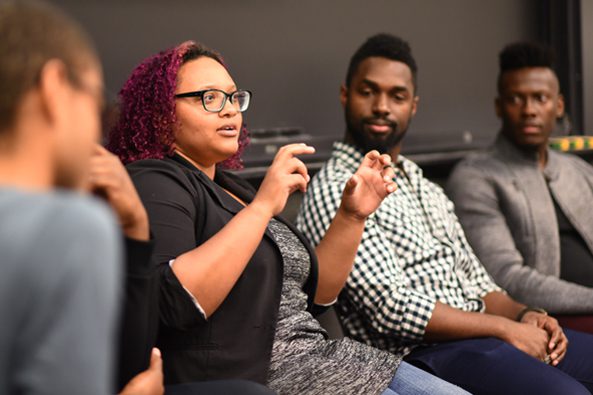
Students Roderic Morris of Drift, Amal Hussein, Nana Essilfie-Conduah, and Adam Taylor / Photo via Mimi Phan
Read more about this diverse take on tech’s diversity issue here.
AI Knows What Customers Want, Transforms Supply Chains – D’Amore-McKim Blog
D’Amore-McKim’s distinguished professor of supply chain management Nada Sanders uses Spanish “fast fashion” company Zara as the shining example of an optimized supply chain that uses artificial intelligence to drive customer satisfaction. In fact, many other businesses have begun to crib notes.
“Seven-Eleven Japan has taken lessons from Zara, using technology to microsegment demand and to understand what customers want. They will literally reshuffle and change what the merchandising looks like in the course of one day, in one location, for different segments of customers.”
Read more about professor Sanders’ research here.
Babson Reveals New Scholarships, Rankings, for Blended Learning MBA – MetroMBA
MetroMBA recently spoke with F.W. Olin Graduate School of Business faculty director Phillip Kim about the shape of the Babson Blended Learning hybrid online MBA program, shortly after the school earned some high praise from the likes of the Financial Times.
“Our program integrates the best of the ‘full-time’ graduate experience with a delivery format designed for working professionals, whose time is at a premium. Our students can complete their MBA in 21 months while working full-time. They learn from accomplished faculty, who are experts in their own disciplines and translate academic concepts into practical takeaways for our students. We are also the number one school for entrepreneurship education, and this ethos is infused throughout the program.”
Read more of our interview with Kim here.
The Future of Employment at Philly Business Schools
When considering where to get your MBA, one of the first questions you should ask is, “What will my employment outlook be?” After all, the reason you get an MBA is to improve your career. But what is important when it comes to employment trends at the leading business schools in Philadelphia? There are quite a few different statistics you should look at.
Important MBA Employment Statistics
To choose an MBA program based on your future career success, there are a few questions you need to answer.
- What industry do I want to work in and does the school place a majority of their students in that industry?
- What percentage of students receive and accept job offers? The same for internships?
- Self-employed or entrepreneurship data?
- What salary can I expect?
- Where do most students end up living and work?
- Who are the top employers?
You also want to look at any trends between years. For example, the percentage of students receiving job offers should increase year-over-year. And if you see a shift from the consulting industry to financial services, you want to be aware that the school could be changing its direction.
So, what does employment look like for three of the top Philly business schools?
The Wharton School
At the Wharton School at the University of Pennsylvania, the employment trends year-over-year are fairly consistent. While the percentage of students reporting job offers dropped from 2016 to 2017, part of that reason may be the increased number of students seeking employment (75.2 percent vs. 79.1 percent).
As for the increase in median salary, that can be attributed to inflation as well as an increase in job salary for each industry including professional services rising from $160,000 in 2016 to $180,000 in 2017. The location of jobs also changed slightly between 2016 and 2017, but that could be due to various reasons including the current state of international affairs for the U.S.
| The Wharton School | 2017 | 2016 |
|---|---|---|
| Percentage of students reporting job offers | 97.1 percent | 98.3 percent |
| Percentage of self-employed students or those starting their own business | 4.8 percent | 5.8 percent |
| Median Salary | $130,000 | $125,000 |
| Location Choices | 88.7 percent U.S. 11.3 percent International | 86.9 percent U.S. 13.1 percent International |
As for where MBA students at the Wharton School gain employment, there are a few important notes. The same top three industries—financial services, consulting, and technology—attracted students in both 2016 and 2017. However, the percentages were a little more evenly distributed in 2017. As for the companies hiring students, most of the same companies showed up each year.
| Top Three Industries | Percentage of Students (2017) | Percentage of Students (2016) | Companies Employing Two or More Students (2017) |
|---|---|---|---|
| Financial Services | 32.7 percent | 35.1 percent | Barclays, CITI, and HSBC |
| Consulting | 28.3 percent | 26.6 percent | A.T. Kearney, McKinsey & Company, and Boston Consulting Group |
| Technology | 16 percent | 12.6 percent | Adobe Systems, Amazon, and IBM |
Penn State Smeal College of Business
Pen State’s Smeal College of Business is consistent year-over-year in regards to its MBA employment trends. The percentage of student reporting and accepting job offers increased between 2016 and 2017 from 88.9 percent to 91.5 percent. However, the median salary stayed consistent at $105,000, and the hiring trend of most MBA students staying in the U.S. also remained the same.
| Penn State Smeal College of Business | 2017 | 2016 |
|---|---|---|
| Percentage of Students Reporting Job Offers | 91.5 percent | 88.9 percent |
| Median Salary | $105,000 | $105,000 |
| Location(s) | 98 percent U.S. 2 percent International | 96.5 percent U.S. 3.5 percent International |
As for where MBA students at Smeal College gain employment, there are a few important notes. While the same industries made the top four each year, where they placed changed. In 2016, the top industry was consulting (25 percent) while that changed to manufacturing in 2017 (20 percent). In 2017, retail also moved into tie consulting for the second most sought-after industry, while technology actually decreased year-over-year (23 percent vs. 15 percent).
| Top Four Industries | Percentage of Students (2017) | Percentage of Students (2016) | Companies Hiring |
|---|---|---|---|
| Consutling | 18.5 percent | 25 percent | Deloitte, EY, and PricewaterhouseCoopers |
| Technology | 15 percent | 23 percent | Amazon, Apple, and Dell |
| Manufacturing | 20 percent | 14 percent | Amphenol Corp, CHEP, International Inc. |
| Retail | 18.5 percent | 14 percent | Anheuser-Busch, Proctor & Gamble, and Johnson & Johnson |
Rutgers Business School, Camden
In 2017, the Financial Times ranked the Rutgers MBA as the best program for MBA employment across Big 10 schools. In 2016, Bloomberg Businessweek also ranked Rutgers as the best MBA program for job placement in the U.S. This indicates a relatively steady year-over-year employment trend for MBA students.
As for the median salary of a Rutgers MBA, students in 2017 could expect to earn $95,680. As for the most popular industries, they were:
- Pharmaceutical/Biotech/Healthcare: 46 percent
- Consulting: 13 percent
- Consumer Products: 13 percent
- Other: 14 percent









